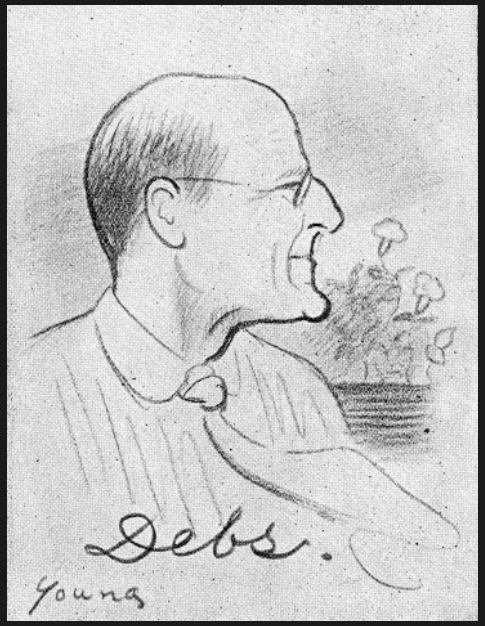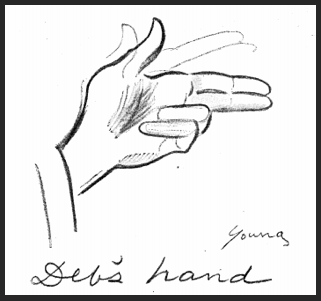I have no country to fight for;
my country is the earth;
I am a citizen of the world.
-Eugene Victor Debs
~~~~~~~~~~~~~~~~~~~~~~~~~~~~~~~~~~~~~~~~~~~~
Hellraisers Journal, Sunday September 8, 1918
Terre Haute, Indiana – John Reed and Art Young with Debs on July 4th
From The Liberator of September 1918:
With Gene Debs on the Fourth
By John Reed
[Part II]
—–
It was on the Fourth of July that Art Young and I went to Terre Haute to see Gene. Barely a month before, the terrible rumor had gone round, chilling all our hearts- “Gene Debs is going back on the party!” That lie he nailed in the ringing statement published in the New York Call, and the Wallings, the Simonses, the Bensons cringed under the lash of his words…. Then came his tour through the middle states, menaced everywhere with arrest, violence, even lynching…and Debs calmly speaking according to schedule, fearless, fiery and full of love of people…. Then his Canton speech, a clear internationalist manifesto, and the Cleveland arrest.
“Gene Debs arrested! They’ve arrested Gene!” people said everywhere, with a shock, a feeling of pity, of affection, of rage. Nothing that has happened in the United States this year has stirred so many people just this way. The long sentences given to conscientious objectors, the suppression of the Socialist press, the indictment of editors, lecturers, Socialist officials under the Espionage and Sedition Acts-people didn’t seem to be deeply moved by these things; but the arrest indictment of Gene Debs-of Gene Debs as a traitor to his country! That was like a slap in the face to thousands of simple people-many of them not Socialists at all-who had heard him speak and therefore loved him. Not to mention the hundreds he has personally befriended, helped or even saved from every sort of evil….
“Gene Debs arrested! Our Gene! That’s going too far!”
It appears that Allan Benson had come out with a piece in the paper criticizing the authorities for arresting Deb at the moment when he was “just on the point of going over to the National Party!” Sitting there in his darkened sitting-room, with the busts of Voltaire, Rousseau and Bob Ingersoll just behind him, he chuckled over Mr. Benson’s perspicacity. I couldn’t help seeing a ludicrous mental picture of Gene Debs in the company of pious Prohibition preachers and Socialist renegades. “Cheap skates,” was Gene’s dismissal of the whole tribe.
He was in bed when we arrived, but insisted on getting up. Not very well, his wife said; had not been well a whole year. How gaunt and tall he was, how tired his long burned-up body looked; and yet with what a consuming inward radiance he came forward and greeted us, holding both his hands on ours, looking at us so eagerly, as if his affection for us was so deep…. We felt wrapped in Gene Debs’ affection. I had never met him, but I had heard him speak. How from that body and soul then he had poured out vitality, flaming across all his time, warmth and courage and belief!
Now he was older, more ravaged by the strain of giving and fighting; but his smile was still as delighted, and his sympathy as wonderful, and the tides of his indomitability at the service of anyone….
Gene talked. You who have never heard him talk don’t know just what that means. It isn’t erudition, fine choice of words, or well-modulated voice that makes his charm; but the intensity of his face, glowing, and the swift tumbling out of his sincere words. He told about his trip, describing with boyish pleasure how he outwitted the detectives watching for him in Cleveland; and how mayors and patriotic committees in little towns had warned him not to speak-and he had spoken, just the same.
“Aren’t you afraid of lynching?” I asked him.
Gene smiled. “Now that’s a funny thing,” he said. “I just don’t happen to think about it, some way. I guess I’m sort of psychically protected, anyway. I know that so long as I keep my eye on them, they won’t dare to do anything. As a rule they’re cowardly curs anyway. Keep your eye right on them, that’s all….”
Outside as he talked to us the automobiles went by, covered with flags, and the sound of the parade came drifting down…. Looking through the darkened windows we watched the people. As they passed the house they motioned or pointed toward it, with expression compounded half of eager malice, and half of a sort of fear. “That’s where Gene Debs lives,” you could see them saying, as one would say, “The House of the Traitor….”
“Come on,” said Gene, suddenly. “Let’s go out and sit on the front porch and give ’em a good show, if they want to see me.”
So we went out on the porch, and took off our coats. And those who passed only looked furtively our way, and whispered, and when they caught Gene’s eye, bowed over-cordially.
The old man told us how the people of Indiana, and indeed, of all the Middle States, were well-broken and terrorized by “Loyalty” leagues, citizens’ committees, vigilantes-and whipped into hysteria besides…. The old frankness which still characterized Hoosier farmers before the War, was now all gone. No one dared speak his mind to anyone. Many, many loved him, Gene Debs, who dared not testify in any other way except by anonymous letters…. He spoke of leaders of the people who, after being beaten by mobs, or tarred-and-feathered, abandoned their rebellion and conformed to the view of the majority.
“If they did that to me,” said Gene, “even if I changed my mind I don’t think I could say so!”
There was something tragic, and funny, in the way Terre Haute regarded Gene. Before the war Gene added luster to the name of the town, as well as having an immense personal popularity. In the beginning, practically the whole population, all through that section, was against going to war…. But since the war the usual phenomenon has happened in Terre Haute. The whole place has been mobilized physically and spiritually. Except Gene Debs. The simpler people couldn’t understand it. The bankers, lawyers and merchants felt for him a terrible rancour. Even the ministers of the gospel, who had often implored him to address their conventions, now held meetings denouncing “the enemy in our midst.”
No names were mentioned. No one dared to call Gene Debs “enemy” to his face. When he went down the street, everyone was studiously polite. Department of Justice operatives, volunteer detectives of all sorts, Liberty loan agents, prowled all around his house-but did not dare to enter and front the old lion. Once a business men’s “patriotic” committee descended upon a German-born workman, and threatened him. Gene heard about it, and sent word to the committee:
Come down to my house, why don’t you, instead of to the place of a poor man. I have a shot-gun waiting for you fellows.
The committee did not come….
I have a picture of Gene Debs, his long bony head and shining face against a background of bright petunias in a box on the rail, his lean hand lifted with the long, artist’s fingers giving emphasis to what he said:
Say, isn’t it great the way most of the boys have stood up? Fine! If this can’t break them down, why then I know nothing can. Socialism’s on the way. They can’t stop it, no matter what they do. The more breaks the other side makes, the better for us….
And as we went down the steps, wringing our hands, clapping us on the shoulder, winning and warm, he said-and all the neighbors could hear him, too-
Now you tell all the boys everywhere who are making the fight, Gene Debs says he’s with you, all the way, straight through, without a flicker!
[Part II of II]
~~~~~~~~~~~~~~~~~~~~~~
SOURCE & IMAGES
The Liberator
(New York, New York)
https://www.marxists.org/history/usa/culture/pubs/liberator/
-September 1918
Page 7: “With Gene Debs on the Fourth”
-by John Reed
https://www.marxists.org/history/usa/culture/pubs/liberator/1918/07/v1n07-sep-1918-liberator.pdf
See also:
Note re: “the Wallings, the Simonses, the Bensons cringed under the lash of his [Debs’] words.
-This most likely refers to the pro-war Socialists of the Social Democratic League of America; Walling, Simon and Benson were members (scroll down to prominent members).
https://en.wikipedia.org/wiki/Social_Democratic_League_of_America
Tag: USA v Debs 1918
https://weneverforget.org/tag/usa-v-debs-1918/
The Education of John Reed: Selected Writings
-with bio by John Stuart
(“IWW in Court” on page 175)
International Publishers, 1955
https://books.google.com/books?id=4wFHAAAAYAAJ
~~~~~~~~~~~~~~~~~~~~~~~~~~~~~~~~~~~~~~~~~~~~~


